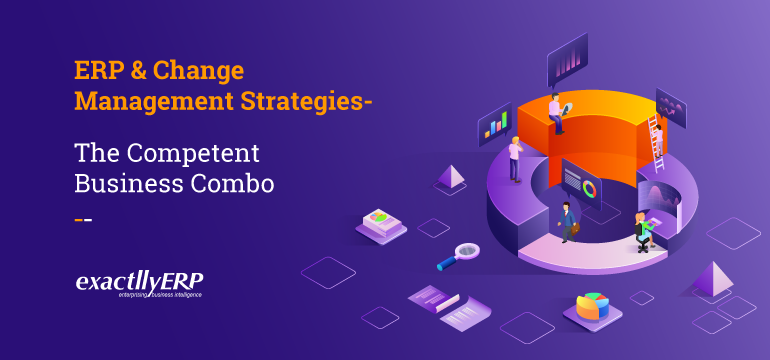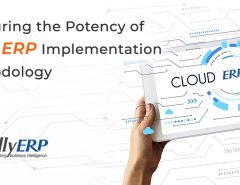Every organization engages in initiatives to improve performance, address key issues and grab opportunities to make modifications to processes, organization structure, or job roles. To do it efficiently, in a business, every employee needs to adopt and embrace changes, without which the initiative would not deliver expected results. Hence, change management is a vital element in any organization. It is a systematic approach to deal with the transformation of an organization’s processes, goals and technologies.
Change Management Strategies are essential for the successful implementation of a company’s Enterprise Resource Planning (ERP) system. According to marketing principles, change management strategy comprises of three phrases:
- Preparing To Change
- Implementation Of Change
- Measuring The Impact On The User
In the first phase, i.e., in the period of preparing to change, company leadership should focus on transforming organizational culture and structure. This can be done by watching the individuals, the organization itself and the culture of the organization.
Secondly, the implementation of the change phase requires organizations to apply the following factors:
- Project leadership & team effectiveness8
- Effective communication with end-user
- Redefine Company Culture
- End-user training & proper involvement
- Measuring the impact on user phase
Organizations can measure the effect of change strategy factors on the end-user as well. Also, companies need to pay attention to feedback in the previous three phases to modify mistakes and develop a change strategy.
Take a look at the ERP & Change Management Strategies: The Competent Business Combo
1. Implementing Employee Recognition Program –
Implementing an employee recognition program is considered to be one of the best change management strategies. Companies can arrange to offer incentives to the employees and needless to say; this will encourage them to accept the change and ultimately engage with the new progress of the company.
An organization can tailor the incentive program according to specific actions and company values to motivate the customers in many different ways and let them be more productive.
Incentives help reinforce the behaviours of the employees; what the management always looks for during a significant transformation in the organization. It also displays how the company appreciates and acknowledges its employees during difficult times too.
2. Hiring Frontline Proponents who Advocate Change –
One of the vital change management strategies includes hiring people who have gone through a similar experience and have the know-how to tackle and emerge victorious in the entire process.
Organizational changes result in upheaval and there’s no doubt that there should be a high degree of resistance to meet with the odds. This can happen only when the champions belong from the workforce instead of only from the management level.
It’s highly rewarding if you recruit employees who understand the necessity of organizational change and share their views on the importance of their peers. Such a process can speed up lower the degree of resistance, employee buy-in and serve as a means for collecting feedback and disseminating information regarding the planned change initiatives.
3. Giving Value to Clear and Frequent Communication –
Communication is valuable when there’s a radical transformation in the organization. Engaging staff in fruitful discussions has a significant impact on your business and is an integral part of any ERP implementation.
Communication is also critical to explain clearly the rationale behind the change goals. Needless to say, most of the groundwork has been by the employees. Hence they need to understand the proper objective – why an organization is planning for such a change, how it will be implemented and what should be their role and responsibility in this regard.
4. Reinventing Organizational Cultural Values –
Every organization has its own culture and when the organization introduces a new ERP system, naturally there will be a change in the culture too. Now, profitable change management is to acknowledge the transformation and reinvent organizational cultural values.
According to this principle, employees need to realize what the existing culture is and clearly visualize and articulate the changes that are coming. They will be more receptive and adapt to the new and innovative way of working.
5. Arrange and Set-Up Continuous Training –
When an organization brings in change, there are transformations in processes as well as technologies. So, it’s essential to arrange for and set up continuous training for the employees. Adequate training would upgrade their skills and help them perform their tasks efficiently.
Thus, your employees would not feel lagging behind and will spontaneously accept and align themselves with any kind of transformation that comes their way.
But as a modern manager, you need to understand practical training requires multiple levels and a variety of methods.
Key Takeaways :
ERP system and its implementation is not an easy task. The competence and impact of ERP mainly depend on positive organizational transformation. But the conversion cannot be successful if there’s no proper communication or planning. So, change management strategies are essential to let the employees know about the paradigm change you are about to bring, or you have already brought.
Exactlly lets you know how you can use change management for effective ERP. We offer you enterprise software solutions that are tailored to meet your specific business requirements. Choose us to transform the way you work. Don’t hesitate to Contact Us and get a Free Demo.





Leave a Reply